Abstract
The construction of The Pearl Qatar community housing was identified and chosen for this assignment because it is a significant development project in Qatar. It also represents the growth of construction technology, given that it is built on land reclaimed from the sea. The ambitious luxurious homes and commercial developments represent some of Qatar’s finest architectural designs. It is a combination of traditional, European, and modern themes.
The research explored the available literature on the project. EBHOST and Google Scholar databases were used to access information for this assignment. A number of books and articles were selected depending on their relevance to the research topic. The project is located in the South East of the city of Doha. The project was designed and developed by United Development Company, a Qatari real estate developer.
The literature revealed the magnitude of the project and the various districts and precincts that have occupied the 400 hectares island. The Pearl Qatar is a prestigious development targeted at both local and international investors, including short-term and long-term residents. A number of photographs are used in this assignment to show the development project. They include Porto Arabia, Medina Centrale, and Qanat Quartier. The project has been negatively affected by the failure of the contractors to meet crucial deadlines. It is recommended that the developer should urgently complete the project in view of the fact that the country is preparing to host the World Cup in 2022.
Introduction
The last decade has witnessed emerging planning of planning interventions in the urban architecture of Doha. The new interventions include the city’s mega projects that are large in size, strategically located, and targeted at the urbane population (Salama and Wiedmann 89).
A robust economic growth that is supported by strong market forces and insightful visions on the part of the government are some of the factors behind the increased investment and development in the country. The efforts are aimed at propelling Qatar forward into the post-modern society. The government’s renewed development focus has enabled the country to secure the opportunity to host the popular World Cup in 2022. Winning the opportunity to have the World Cup has accelerated the inflow of investment and construction of infrastructure, social housing, healthcare, and education facilities (Dahal and Prakash 2014). The new interest in the construction of social housing is aimed at helping Qatar accommodate the country’s future growth and the expanding population. One such development is the mega Pearl Qatar complex.
The aim of this paper is to explore the development of Pearl Qatar. It is an ambitious housing project that is built on an artificial island in Qatar. The paper will analyze, among others, the impacts of this project on the city’s architectural planning.
Basic Information and Documentation
The Construction of an Artificial Island
The advancements in the construction industry are viewed as having changes in the global infrastructure. For example, the construction of artificial islands represents contemporary infrastructural development in the world today. An artificial island, such as the Pearl Qatar, is a landmark that is surrounded by water. It is created artificially by the use of machines and advanced technology (Dahal and Prakash 2013). The creation of the landmark is a demonstration of the ability of engineers and architectures to use various engineering concepts that have introduced radical changes in construction technology.
The creation of artificial islands, such as Pearl Qatar, involves the adoption of land reclamation techniques, dredging, and elaborate soil-bed preparations. It also involves underwater concreting. The most critical process in building these artificial islands is the land reclamation technique. The reclamation simply means the building of new land from water bodies (Dahal and Prakash 2013). The land reclamation concept has been utilized in developed countries, such as the Netherlands and Japan, with remarkable success. Qatar has recently joined the list of countries that have successfully reclaimed land from the sea.
The building approaches involving the use of land reclamation technology entail three significant steps. However, based on the site conditions and subsequent requirements, some changes may be made to these procedures (Dahal and Prakash 2013). The first stage in the building of an artificial island includes the remediation of the sea bed. The remediation is followed by the construction of sea walls and defense. Finally, the “fill” is used to fully reclaim the land and construct on it.
The remediation involves altering the seabed to avoid settlement issues. The process may vary from one island to another. It is dictated by the different soil characteristics and the geological formations present in the area. The sea defense is composed of the constructions separating the reclaimed land from the water (Dahal and Prakash 2013). The sea defenses are made using different strategies. The objective of erecting the defenses is to ensure that seawater does not encroach into the reclaimed land. Filling in the last crucial process in land recovery. It is used for the purposes of the construction of a manmade island. It includes the use of sand and rabble. The material is used in building the land over the identified seabed. (Dahal and Prakash 2014)
The City of Doha
Qatar can be described as a small and scorched peninsula. The country has witnessed major transformations between the 1960s and 1980s (Wiedmann et al. 46). It has been transformed from a poor British protectorate, which was mainly recognized for pearling, to an independent nation with recognizable modern infrastructure, industries, and services. The transformation has been built using foreign labor. Most of the funding to support these changes has come from oil revenue.
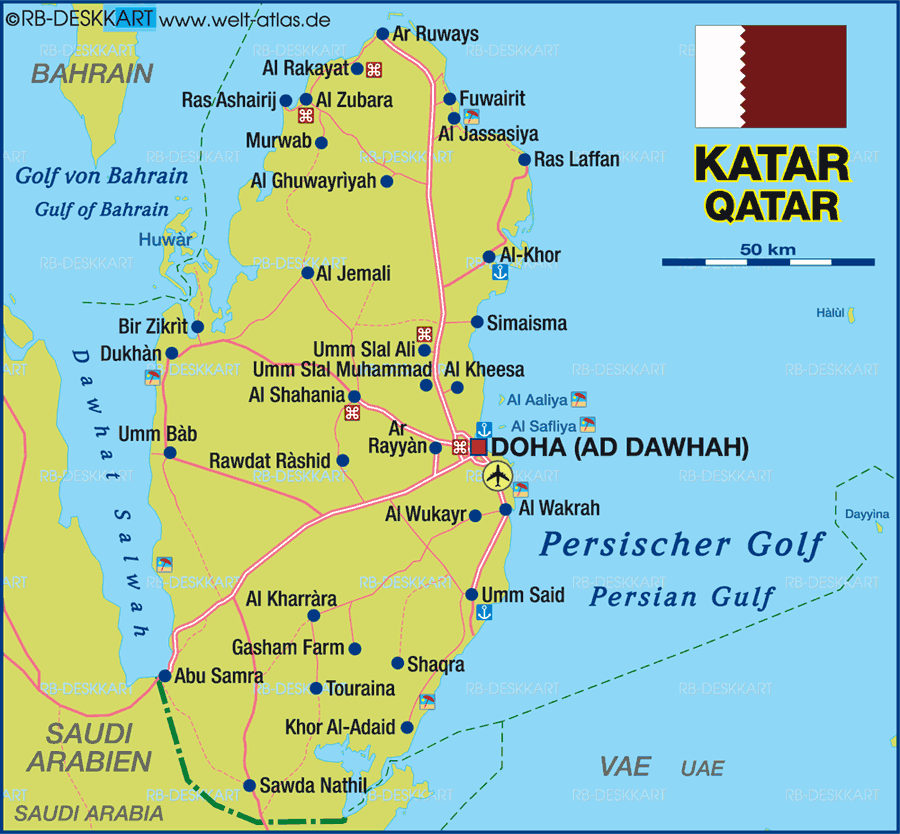
The discovery of oil changed the fortunes of the country, especially with regard to architecture. To this end, the existing slum-like dwellings were replaced by buildings that were considered modern at the time. Oil drilling became a major economic activity. There was also the dredging of the port to accommodate larger ships. With these changes, a new era was witnessed in the Qatari architectural landscape. The era was characterized by the extensive land reclamation that gave Doha a crescent bay (Wiedmann et al. 59). The land reclamation was to be revisited during the development of the Pearl Qatar real estate island.
Within the last few decades, Qatar has witnessed steady urbanization, which is associated with the rapid increase in oil production. Currently, the government is implementing various development initiatives and strategies. The aim of these initiatives is to diversify the country’s economy. The move has resulted in a rapid urban revolution (Wiedmann et al. 55). Doha has witnessed significant growth throughout its history. It used to be a fishing township in the 20th century. However, today, it has turned into an emerging vibrant urban center. Its population is approximately 1.5 million people. The development calls for an innovative approach to architectural planning in the country.
The city of Doha has expanded significantly. The expansion is supported by iconic buildings and large scale housing projects, such as the Pearl Qatar, which was designed and developed by the United Development Company (Vignal 20). The project is characterized by distinctive architectural themes that are carefully chosen in order to attract potential investors. The Pearl is hailed as a significant piece of reclaimed land and an offshore real estate project that represents modern Arabia. The project’s hybrid eclectic style is a reflection of the local and Mediterranean architecture. The hybrid architecture is used for the purposes of establishing a distinctive image.
The naming of the residential districts is also aimed at offering an exotic flavor to the residents. The districts include the Porto Arabia, Viva Bahriya, and Costa Malaz (Vignal 24). The exotic names are meant to add an international flair to the project, which enhances the different lifestyle opportunities available to a cosmopolitan and exclusive multi-cultural community.
The Pearl has given priority to the general make-up of urban setting. The approach includes the use of architecture and distinctive waterfront promenades instead of individual structures. Nevertheless, The Pearl urban housing project is viewed by some sections of the community as lacking local authenticity. The reason is that it uses an eclectic combination of Mediterranean and European architectural styles. The styles are not rooted in the local culture.
As such, they are seen as foreign additions to the local setting (Vignal 24). However, it should be noted that the architectural style is deliberately chosen because the project is not meant to house the local elite. On the contrary, it is meant to attract the international investing community. The architectural style is supposed to be in tandem with the cultures of potential investors. As such, The Pearl project’s application of the mix-use development approach produces a potentially surreal Venetian atmosphere.
Geographical Location of The Pearl Qatar
The Pearl Qatar is located within Doha. The Qatari capital city, Doha, is located to the central-east part of the country. It borders the Persian Gulf. The city is only 10m above sea level. The area has witnessed significant land reclamation undertakings on its coast with more than 400 hectares of land added to the city. The city has also added a 30 kilometers coastline to its border (Dahal and Prakash 2015). A significant development in the reclaimed land is the Hamad International Airport. Half of the airport’s 22km surface area is sitting on reclaimed land.
The Pearl Qatar is an artificial island occupying a reclaimed land of approximately 400 hectares (1,000 acres). The estimated total cost of the Pearl Qatar project is $15 billion on completion (International Business Publications 13). The country has other reclaimed land islands. They include Al Safia, Shrao, and Alia islands. The figure below is a representation of the geographical location of Qatar:
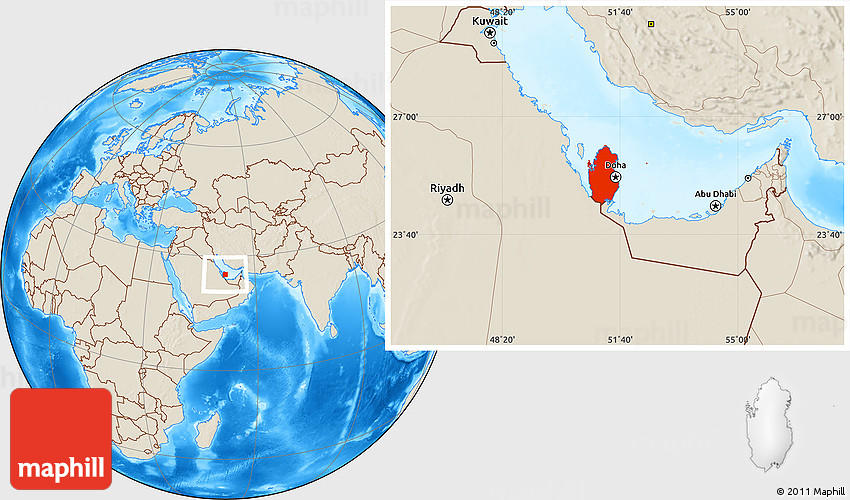
The Climate of Qatar
Doha has an extremely hot dessert climate. The summer season is long and extends from May to September. The average temperatures surpass 380 Centigrade. They can rise up to 450 Centigrade (International Business Publications 14). The city has low humidity especially in the months of May and June. During the summer season, the city experiences almost no precipitation, while other months record less than 20 mm of rain (Wiedmann et al. 56). The country rarely experiences long durations of rainfall with only an average of 75 mm registered in a year. The rain also falls in isolated days. While the winters are cold, temperatures rarely fall below 70 Centigrade (International Business Publications 17).
Literature Review
The Pearl Qatar Development Project
The Pearl Qatar is an offshore, manmade island that is estimated to cost approximately $2.5 billion on completion. The island covers approximately 400 hectares of reclaimed land (Salama and Wiedmann 67). The project is referred to as Qatar’s first project dealing with international real estate ventures. It is also the biggest real estate development in Doha. The project is a pioneer in the field of freeholds and residential rights. The developers are targeting international buyers and investors (The Pearl Qatar). The figure below is an aerial view of The Pearl Qatar:
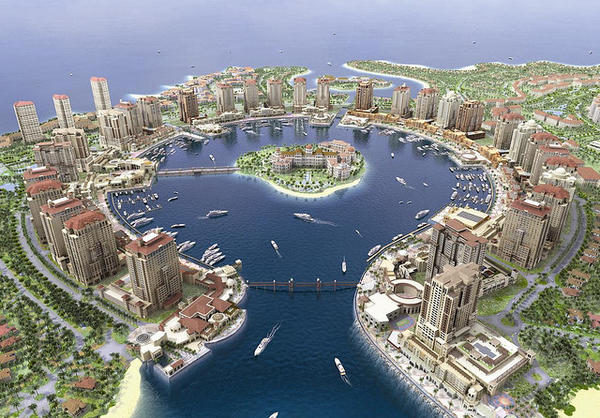
The name of the project and its location reflect the country’s traditions. The project creates a link between modernity and the nation’s historical and cultural association with the sea. The project is expected to house more than 30,000 residents. The residents will occupy an up-scale and culturally diverse community. They will be living in an exclusive and safe island (Salama and Wiedmann 67).
The Pearl Qatar is a four-face development project that comprises of ten districts that were developed over a period of five years. People started occupying the island in 2007. The Riviera-themed districts have three extravagant and international hotels. They also have three marinas. It is noted that the project can accommodate approximately 700 boats. The Pearl Qatar development also has a 60,000 square meters of luxury restaurants and retail outlets space (International Business Publications 56).
The luxurious island is set 350 meters into the sea. It is located in the West Bay area of the city. It increased the length of the coastline by more than 35 kilometers. The project is the brainchild of United Development Company (International Business Publications 56). The developer is one of the largest private companies handling mega-size real estate projects in the country. The figure below is a view of The Pearl Qatar:
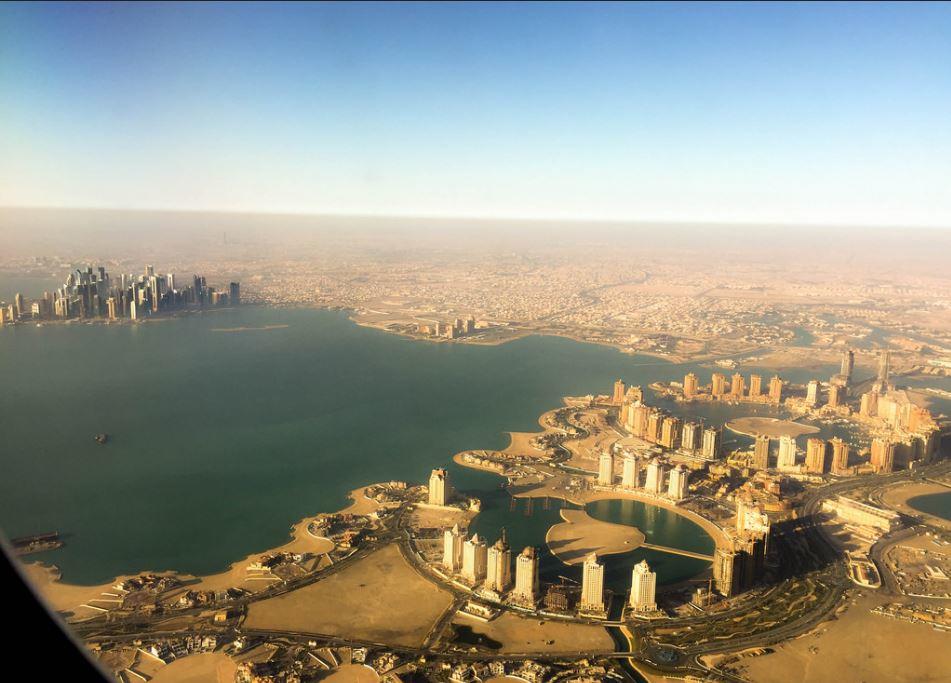
Most artificial island developments within the Gulf region are built on areas with sufficient water depths. The water depths allow for easy access of the huge dredging equipment. However, the developers of The Pearl Qatar chose the former pearl bank, a shallow area (International Business Publications 56). By going for a shallow area, the developer significantly reduced the total project requirements, including the fill to be dredged.
The Pearl Qatar development project has been described as a luxurious jewel in the Middle East. The project, spanning over four million square meters, demonstrates the vivid elegance of contemporary grace that carries a subtle mix of Mediterranean, European, and Arabic cultures (Salama and Wiedmann 78). The Pearl Qatar is a mixed- use development that accommodates in excess of 50,000 local and international residents.
The island boasts of 19,000 houses that have been constructed within the distinctly themed precincts. The precincts feature five star hotels and services. In addition, the island has beachfront houses and villas, as well as elegant townhouses, exclusive penthouses, and luxury apartments (Salama and Wiedmann 67). The island has been described as an exclusive and lavish retreat away from bustle of the city of Doha. The development is strategically located near the capital city’s business district. It is only takes 20 minutes to drive from the Hamad International Airport to The Pearl Qatar.
A Review of some of the Retail Districts in The Pearl Qatar
Porto Arabia
The figure below is a representation of Porto Arabia, one of the retail districts in The Pearl Qatar:
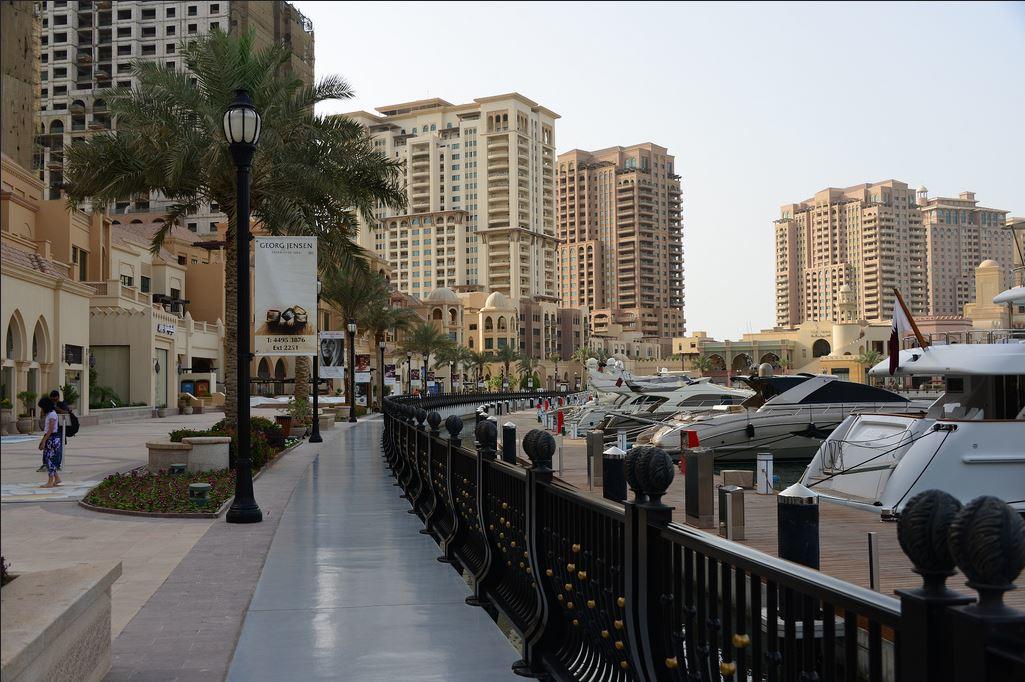
Porto Arabia is located at the cosmopolitan center of the luxurious Pearl Qatar. The district was the first and probably the largest precinct harboring a dynamic shopping area. It also includes restaurants, hotels, and residential districts (Wiedmann et al. 58). The precinct boasts of beautiful apartments, elegant townhouses, and luxurious penthouses. There are also chic boutiques, as well as world class beverage and food outlets located along the three kilometer waterfront. The setting is similar to that in South France.
The precinct is a ring-shaped development with beautiful landscapes, which are themed along the lines of lush European gardens. The development accommodates 20-story towers with 4800 units and 31 luxury condominiums. In addition, the precinct has 437 townhouses, 380 food courts, and other retail outlets occupying over 100,000 square meters (Wiedmann et al. 52).
Medina Centrale
The figure below is a picture of Medina Centrale:
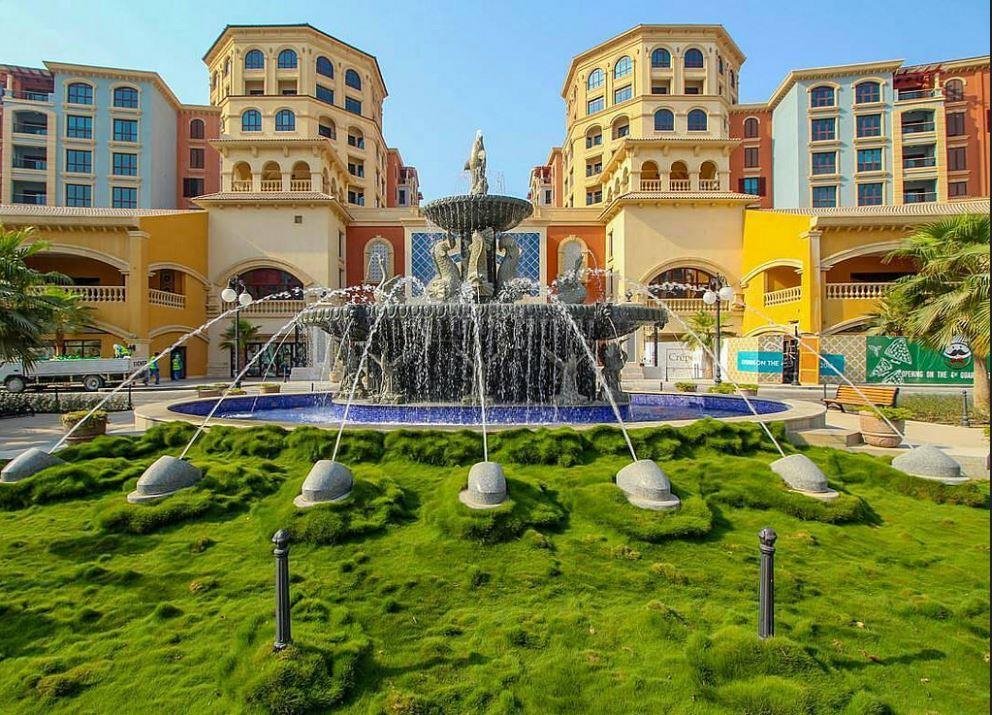
Medina Centrale is The Pearl Qatar’s town center. It comprises of an impressive town square, which is surrounded by low-rise Roman style structures featuring terraces and gardens. It offers a wide range of retail and community services for the entire island population (Wiedmann et al. 59). The Medina Centrale precinct is located between the Viva Bayriya and Porto Arabia. The precinct is viewed as the economic hub of the artificial island. It is constructed around a town square that has adjacent streets. Most of the residential buildings at Medina Centrale are low-rise residential structures. They are built with Mediterranean architectural style themes.
Qanat Quartier
The picture below shows The Pearl Qatar’s Qanat Quartier:
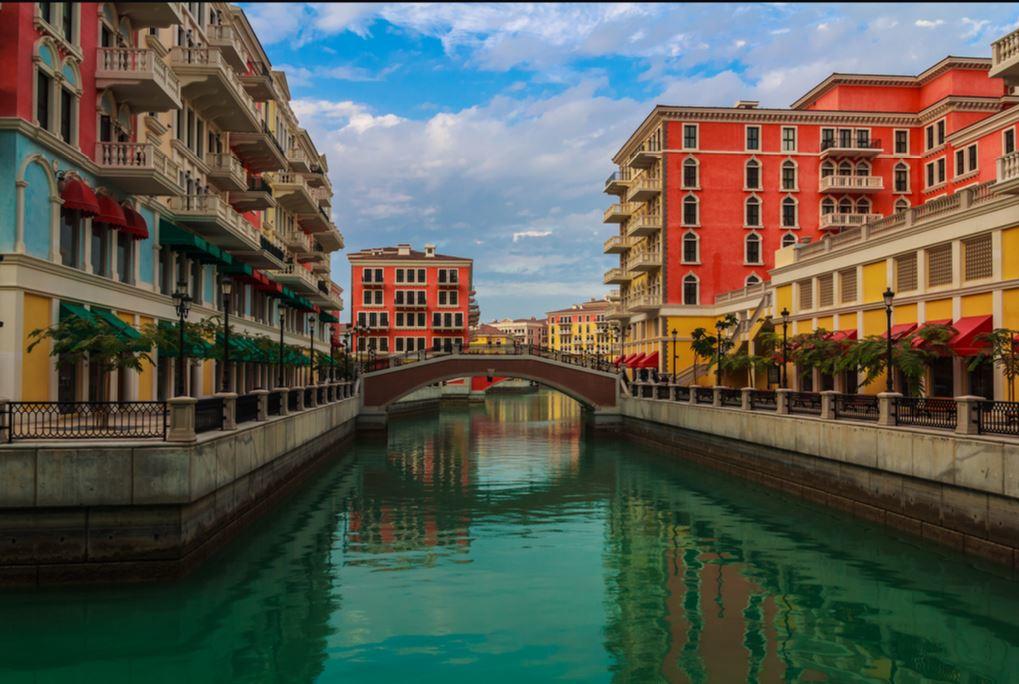
Qanat Quartier is viewed as a little Venice and the finest address in the city of Doha. It is inspired by the waterways and canals found in Amsterdam and Venice. The precinct is located at a waterfront tucked away from the main thoroughfare of the island (Wiedmann et al. 58). The village features a calm and serene environment dotted with an assortment of pastel-colored apartments, penthouses, and townhouses. It is set amidst winding canals, sparking fountains, and quaint squares. In addition, the village has citrus trees planted along buildings and the cobblestone courtyards. The village has art galleries, fashion boutiques, hotels, and restaurants.
The Pearl Qatar: Development and Environment
The Pearl Qatar has a fascinating ambience fashioned in the Mediterranean style. It is characterized by a nostalgic traditional architectural style that embraces modern conveniences. The project has an environment that favors the community. The environment is enhanced by the inclusion of a unique mix of gardens, public plazas, canopies, terraces, and piazzas (Salama and Wiedmann 73). The green spaces are meticulously taken care of. The ambience and the refreshing water features make The Pearl Qatar a scenic place.
The United Development Company
The United Development Company is an innovative private entity. It is concerned with massive investments in Qatar. It is also one of the largest shareholding companies in the region’s private sector. In addition, it is one of the top 100 organizations in the gulf region. The United Development Company is a value enterprise that prides itself as a long term investor in carefully selected projects with potential for profitability (International Business Publications 39). In addition, UDC is concerned with the creation of value for its shareholders by actively engaging in profitable investments.
The Pearl Qatar project is one of the company’s prestigious projects. The project is regarded as one of the most glamorous addresses in the gulf region. The Pearl Qatar is a cosmopolitan residential community, which is located at the heart of the capital city (International Business Publications 42). The Pearl Qatar development project is meant to attract both local and foreign investors interested in apartments, townhouses, and condominiums.
Analysis, Criticism, Assessment, and Evaluative Statements
In contemporary society, urbanization and architectural practices are regarded as catalysts in relation to the emergence of modern cities. They play a role in maintaining the position of these cities in the age of global knowledge economy (Salama and Wiedmann 78). The perspective is made evident in the infinite urban typologies and forms experienced in Doha.
The architectural design of The Pearl housing development is a distinct demonstration of the infinite possibilities associated with space planning. It is an expression of openness and an inward focus associated with internal spaces. The project buildings are clustered in an up-scale man-made island. The project design is made to the specific requirements of the developer. The development approach to modern architecture appeals to the manifestation of simplicity of spaces. The project districts, for instance, have their distinct beach fronts (The Pearl Qatar).
The designers of the project have approached it from different types of landscapes. The houses front the roads, while the facades are kind of closed. The buildings have narrow windows meant to break the textured surfaces. The project also includes parking lots paved with cobblestone and residential units surrounded by soft landscaping separated by driveways and walkways (Vignal 20).
. Through the promotion of new opportunities and a desirable lifestyle, the emerging urban images are developed in key spaces within the city. A case in point is the striking and iconic waterfront development, which is the exclusive The Pearl Qatar. The project is characterized by a number of eclectic styles borrowed from regional and international architectural projects. It is aimed at promoting a distinctive development project that uses European-themed design and construction of the housing development
Mega construction projects, such as The Pearl Qatar housing development, are hailed as progressive ventures with the potential of putting Qatar on the world map as an investment destination. However, many architectural critics view the projects as too ambitious for a tiny country operating on a limited timeframe (Dahal and Prakash 2015). The critics point out that there are numerous delays in the construction timelines. For instance, The Pearl Qatar project, which is being undertaken by United Development Company on the vast reclaimed land, was started in 2004 with a completion date set for 2012. However, the project is still ongoing.
Conclusions and Recommendations
The construction of The Pearl Qatar housing project, which commenced in 2004, is an ambitious undertaking by the United Development Company. The housing development is built on reclaimed land. The project occupies an artificial island off the seashore of Doha, the capital city of Qatar. The Pearl Qatar development project has been described as a luxurious jewel in the Middle East. The project, spanning over four million square meters, is a representation of the elegance of contemporary architecture. The architectural design carries a subtle dash of Mediterranean, European, and Arabic cultures.
The Pearl Qatar is a mixed- use development that accommodates in excess of 50,000 local and international residents. It boasts of 19,000 houses that have been constructed within the uniquely themed districts. The precincts have five star hotels and accommodation services. In addition, the island has beachfront houses, villas, townhouses, penthouses, and luxury apartments. The project was the first to offer freehold property rights to the international investment community. On completion, the development project will be one of Qatar’s iconic structures. It will be used to promote the image of the country in the international community. However, the project has been mired by delays. The delays have affected the plans of the investors to meet important construction timelines.
It is the recommendation of this paper that the developers of the Pearl Qatar residential project should accelerate the construction of the remaining phase of the project. The aim is to attract tourists, as well as short and long-term residents. The project is an iconic development in the country. As such, further delays would impact negatively on the image of the nation.
Works Cited
Dahal, Ishwar, and Om Prakash. “The Study on Construction of Artificial Island using Land Reclamation Techniques.” Imperial Journal of Interdisciplinary Research, vol. 3, no. 2, 2017, pp. 2013-2016.
International Business Publications. Qatar Country Study Guide Volume 1: Strategic Information and Developments. International Business Publications, Inc., 2015.
Salama, Ashraf, and Florian Wiedmann. Demystifying Doha: On Architecture and Urbanism in an Emerging City. Routledge, 2016.
The Pearl Qatar. Explore the Island. 2017. Web.
Vignal, Leila. Under Construction: Logics of Urbanism in the Gulf Region. Ashgate Publishing Ltd., 2014.
Wiedmann, Florian, et al. “Urban Evolution of the City of Doha: An Investigation into the Impact of Economic Transformations on Urban Structures.” Middle East Technical University Journal of the Faculty of Architecture, vol. 29, no. 2, 2012, pp. 35-61.